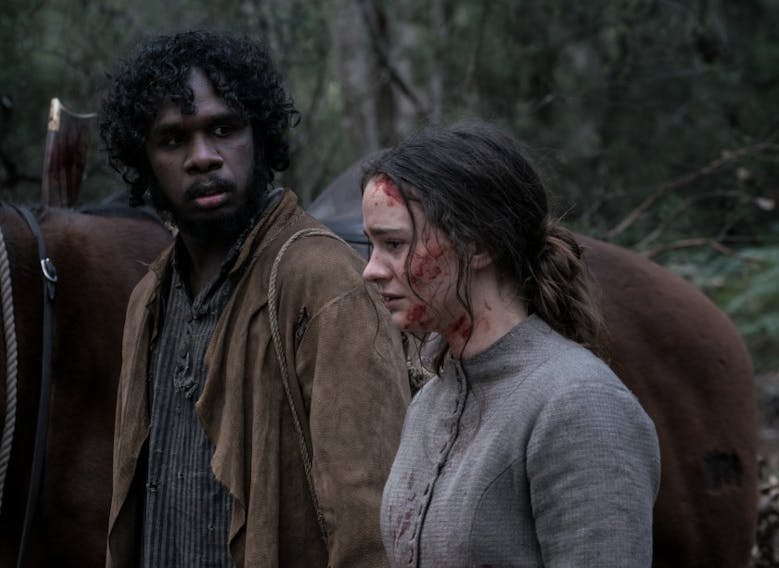After Australian filmmaker Jennifer Kent’s debut critically acclaimed feature film “The Babadook” in 2014 that challenged the notions of the horror genre, she is back with a viciously disturbing tale of brutality. It captures the mostly untold horrors committed throughout history in “The Nightingale,” released limitedly in the U.S. in August.
Set during the Black War — sometime between 1820 and 1832 in Tasmania — “The Nightingale” follows an Irish convict named Claire (Aisling Franciosi, Lyanna Stark from a few “Game of Thrones” flashbacks) who is enslaved by the monstrous English Lieutenant Hawkins (Sam Claflin, “Me Before You,” “The Hunger Games” saga), who in addition to making her sing for him, rapes and torments her regularly. When Hawkins rapes Claire in front of her husband before killing him and their baby, Claire seeks vengeance with the help of an Aboriginal tracker Billy (Baykali Ganambarr) in the wilderness.
“The Nightingale” is a tough pill to swallow due to the horrific atrocities committed on screen. In addition to the horrifying scene in which Claire is raped in front of her husband, several other instances of rape and brutal violence occur throughout the film. The Black War, a lesser-known phenomenon, involved savage acts of evil committed against indigenous Aboriginals by English colonists throughout Tasmania, and Jennifer Kent reminds us of this in the starkest way imaginable. Similar to the narrative of 2015’s “The Revenant,” this is the kind of film that rips a piece of your heart out.
There are several scenes with disturbing violence, which while difficult to sit through, accurately depict the reality of the colonial violence that occurred. While Kent does a strong job of bringing the viewer into this bleak time in history, the writer/director gets a bit carried away at times with the level of detail she chooses to include. We as an audience would still be able to capture the essence of this harrowing war without the need for the staggering amount of rape and murder scenes that last for extended periods of time.
We can understand what Claire and Billy in this time are going through and experience their unspeakable grief, yet the amount of rape and violence becomes all we remember at times due to how disturbing and realistic it is. Many will be very mortified by the film due to this and should be well aware of what they’re getting into. There isn’t enough to distract us in the film from the tragic events that unfold.
Despite being a bit over-the-top, “The Nightingale” succeeds at driving the audience due to Aisling Franciosi’s ferocious and fearless performance. Few characters have experienced such torture as her’s has and the Irish actress infects Claire’s grief and trauma onto us in the most contagious way imaginable. Franciosi is an actress, who while just starting to get her name out, is a force to be reckoned with and a truly powerful performer. Her performance is pure rage and will get your blood-flowing fiercely.

Sam Claflin does remarkable work as one of the single most evil characters in film and television history. Lieutenant Hawkins is a power-driven psychopath, pure evil in every sense. Claflin evokes such a heinous nature into this man that the audience roots for his demise to occur in the most atrocious way imaginable. Few villains have ever driven such anger into me, a sign of an actor who understands his character and how to control audiences.
Director Jennifer Kent knows how to keep us engaged from start to finish. Her portrayal of war as a nightmarish horror tests our every emotion and strangles us in grief. This skill of holding the audience in and generating so much pure emotion is a true gift, yet the storytelling aspect is traded for this reactionary creation. Instead of being moved by the characters’ struggles, we’re moved out of pure disturbance — the growth of the characters or the meaning behind their experiences seemingly forgotten. There needs to be more than just expressing that vengeance is all that’s left for the protagonist.
The relationship between Claire and Billy as they hunt down evil men in the Tasmanian wilderness is explored, yet not intimately enough to make us connect with their duo. Having two traumatized individuals who represent violently oppressed groups of people interact for so long should have led to more of a captivating relationship, yet we’re too horrified and disturbed by the constant brutality that we forget to feel anything hopeful or positive. The potential for a deeper bond is somewhat forgotten, preventing the film from fulfilling its potential.
While Kent is driven to captivate the audience and express the true horrors of the Black War, she forgets to include elements that make the film more structurally stable. “The Nightingale” suffers to find a proper pace, oftentimes feeling as if the script doesn’t have a clear purpose or a direction in mind. While intended to explore the horrors of warfare, we’re left wondering what the actual purpose of the film is after being unsettled the entire time.
Jennifer Kent directs the film in such a gothic, haunting style that’s capable of bringing the happiest person in the world down. Ending on a somewhat hopeful note, “The Nightingale” is a success for its brilliant performances and its ability to get such a reaction out of us despite some narrative flaws.
Many have criticized the film’s portrayal of realistic rape and violence, which are very valid criticisms. Those who brave the film will come out moved for sure, yet how they feel about having their emotions altered in such a forceful way will vary. This historically accurate depiction of brutality won’t escape our mind and is the kind of film that hits like a punch in the gut.
Final Grade: A-
Dominic LeRose is a writer for The Daily Cardinal. To read more of his work, click here.






